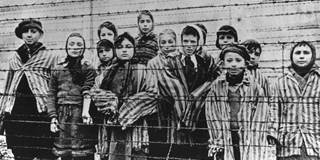Poland's new law criminalizing mention of the complicity of the "Polish nation” in the crimes of the Holocaust is a dangerous attempt to use history as a political tool. Yet Poland's government is hardly the first to edit the past to serve a nationalist narrative, as Israelis should know very well.
MADRID – When, on a visit to Warsaw in 1970, German Chancellor Willy Brandt suddenly dropped to his knees before the Monument to the Ghetto Uprising, Władysław Gomułka, Poland’s communist leader, whispered, “wrong monument.” Gomułka would have preferred a tribute to Poland’s fallen soldiers in World War II. Poland’s current ultra-nationalist government, led by the Law and Justice (PiS) party, would probably have agreed.
In fact, the PiS government is attempting to reshape Poland’s WWII narrative – and not in a whisper – with a new law criminalizing mention of the complicity of the “Polish nation” in the crimes of the Holocaust. While Poles are justifiably offended by use of terms like “Polish death camps” – they were German-run camps, located on occupied Polish territory, and should be remembered as such – the law amounts to a dangerous attempt to use history as a political tool.
For Poles, the prevailing narrative of the Holocaust is exceedingly frustrating. After all, three million Polish Catholics were killed during WWII, and Poland would have been wiped off the map if Hitler had won. Over 6,700 Poles – more than any other nationality – have been honored by Israel as “Righteous Among the Nations” for standing up to the Nazis and saving Jews.

MADRID – When, on a visit to Warsaw in 1970, German Chancellor Willy Brandt suddenly dropped to his knees before the Monument to the Ghetto Uprising, Władysław Gomułka, Poland’s communist leader, whispered, “wrong monument.” Gomułka would have preferred a tribute to Poland’s fallen soldiers in World War II. Poland’s current ultra-nationalist government, led by the Law and Justice (PiS) party, would probably have agreed.
In fact, the PiS government is attempting to reshape Poland’s WWII narrative – and not in a whisper – with a new law criminalizing mention of the complicity of the “Polish nation” in the crimes of the Holocaust. While Poles are justifiably offended by use of terms like “Polish death camps” – they were German-run camps, located on occupied Polish territory, and should be remembered as such – the law amounts to a dangerous attempt to use history as a political tool.
For Poles, the prevailing narrative of the Holocaust is exceedingly frustrating. After all, three million Polish Catholics were killed during WWII, and Poland would have been wiped off the map if Hitler had won. Over 6,700 Poles – more than any other nationality – have been honored by Israel as “Righteous Among the Nations” for standing up to the Nazis and saving Jews.